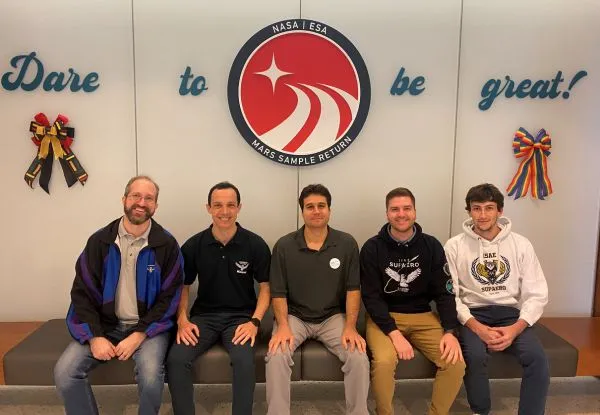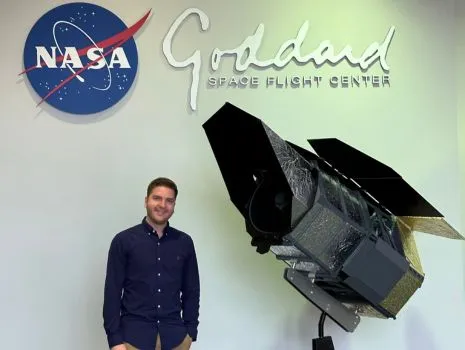< back to articles
A 6-month internship at NASA Goddard for Julien
Published on
My final year internship was an exceptional experience in so many ways. Motivated by the desire to gain significant professional experience abroad and explore a new culture, I finally completed my 6-month internship at the NASA Goddard Space Center (GSFC) near Washington D.C., USA.

Why did you choose NASA?
I chose this opportunity for a number of reasons, not least the chance to acquire new skills, broaden my cultural horizons and, above all, contribute to one of the most ambitious space exploration missions ever imagined.
At the same time, I felt ready to take on some personal challenges. Living abroad required rapid adaptation to a new environment, managing moments of solitude and developing autonomy. These challenges were seen as opportunities for personal growth.
Tell us about your missions:
Julien Rondey

It was within the CCRS project’s Systems Engineering team that I carried out my end-of-studies internship at GSFC. My work plan consisted of the following tasks:
- Support the phase team in generating and monitoring the Success Tree,
- Prototype the Verification and Validation plan,
- Provide a detailed report on the needs, benefits and associated methodology for carrying out a consistent Success Tree Analysis.
My various tasks involved, on the one hand, organizing meetings with the various subsystems that make up the phase and, on the other, interacting with adjacent phases of the project to ensure a clear and concise tree, covering requirements at project level right down to subsystem component level. In addition, my mission included mapping interfaces and documenting the analysis flow, two essential elements in the generation of the Success Tree.
What did you think of your stay?
This end-of-study stay enriched my career considerably: it enabled me to acquire essential practical skills in my field of study, I learned how to work on an ambitious project, solve complex problems and collaborate effectively within a multidisciplinary team. These skills will undoubtedly be a major asset in my future career.
What’s more, this experience has enabled me to develop my ability to adapt to diverse cultural environments. The intercultural understanding I have acquired will be a valuable asset in an increasingly globalized world. I’m now better prepared to work with colleagues and customers from different cultural backgrounds.
What about life in the States?
An incredible adventure. It allowed me to discover a new culture, improve my language skills and make international friends. Of course, I explored the local cuisine and visited historic sites such as the U.S. Congress.
I had the opportunity to visit the National Air & Space Museum, home to the Space Shuttle Columbia, which, among other things, launched the Hubble Space Telescope into low-Earth orbit.
I’ve also been lucky enough to take part in some unforgettable cultural events. This cultural immersion opened my mind and gave me a more global perspective on the world.
I also had the privilege of being invited to the French Embassy on several occasions for enriching meetings, notably with the CNES representative in the United States. These privileged moments of discussion and exchange on subjects related to space exploration were extremely instructive. I was able to benefit from unique perspectives on recent developments in the space industry, current projects and future challenges. These encounters strengthened my passion for space exploration while broadening my professional horizons. It was an exceptional opportunity to talk to an expert in the field and enrich my knowledge, and will remain one of the highlights of my stay abroad.
So, did this trip offer you some great experiences?
During my internship at NASA GSFC, I was privileged to have some unique experiences:

I had the opportunity to visit state-of-the-art facilities, including clean rooms and thermal vacuum chambers, where I observed at first hand the complex work carried out for various space missions.
One of the highlights was a tour of the Hubble Space Telescope’s operations control center, complete with fascinating anecdotes. The visit was organized by an office colleague who had worked on the telescope’s last maintenance mission.
I also had the exceptional opportunity to participate as co-author in the writing of a scientific article linked to the CLS project on which I worked. This article was published for the 34th International Symposium on Space, Technology and Science held from June 3 to 9, 2023 in Fukuoka, Japan.
This experience was a particularly rewarding part of my stay, as it enabled me to make a significant contribution to knowledge sharing on the CLS project: in collaboration with my colleagues and under the supervision of my mentor, I was able to contribute to the writing. This exercise not only deepened my understanding of the subject, but also strengthened my ability to communicate my ideas rigorously. This experience of writing a scientific article will remain one of the highlights of my internship and has undeniably enriched my academic and professional training.
In addition, I had the privilege of engaging in enriching conversations and building relationships with experts in the field, which provided me with valuable technical knowledge about space and an understanding of the challenges and opportunities of the space industry. I’ve even discovered that alumni of my university, ISAE-SUPAERO, are also contributing to the CLS project. I’m particularly proud to have modestly represented and promoted the quality of our programs abroad!
I also had the exceptional opportunity to witness a refueling launch (Antares 230+ – Cygnus NG-19) to the International Space Station from the Wallops Flight Center in Virginia, an incredible moment that underlined the impact of the work accomplished within the agency.
The highlight of my internship was when I was invited to the White House by NASA, along with a dozen other interns, to take part in discussions on American space policies, strategies and the future of space exploration. with Mr. Chirag Parikh, Executive Secretary of the U.S. National Space Council. We even had the chance to visit the ceremonial office of the Vice-President of the United States, Kamala Harris, located in the Eisenhower Executive Building.
And professionally, did it help you find your bearings?
This stay helped me define my professional goals and clarify my aspirations. I’ve had the opportunity to discover different aspects of the space industry and to think about the direction I’d like to take in my career. This experience confirmed my decision to move on as a Systems Engineer or to work on space exploration missions as a Flight Dynamics Engineer. It inspired me to become a more rigorous, autonomous and determined engineer. Working on one of the most demanding projects in this prestigious organization taught me the importance of precision, methodology and innovation.
My passion for the CCRS project I contributed to at NASA GSFC during my final year internship remains intact, and my desire to continue contributing to similar projects is stronger than ever. If the opportunity arises, I’d love to continue my collaboration with NASA or get involved in other space research initiatives.
So it was an enriching stay in every way!
To sum up, my final year internship with a mythical space agency like NASA GSFC was an exceptional experience that contributed significantly to my academic, cultural and personal development. I was able to put my skills into practice, discover a new culture, make international friends and develop my self-confidence. This experience has considerably enriched my career path and given me a clearer vision of my future goals.
This internship really strengthened my interest in the space industry and increased my desire to play an active part in designing tomorrow’s exploration missions.
I’m grateful to have done my internship at NASA, where I consolidated many professional skills. This positive experience will be a great inspiration for the rest of my career.. I look forward to contributing to the continued success of future space exploration.